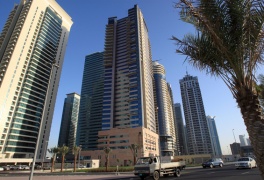
No loud announcements of new major projects was made last week, as it was a week ago, but all that what developers and Dubai authorities were planning to accomplish, create and construct, goes on according to general plan. For example, the management of the future mega complex Dubai Parks and Resorts last week reported of a 50% project’s readiness.
Also, a slight increase in activity was observed last week in the hospitality sector. Dubai Properties promised to add 816 rooms to Dubai hospitality stock due to the construction of four new hotel complexes in Studio City, IMPZ and Dubiotech free zones, designed for the development of eco- and biotechnologies, which trend also will be present in the design of the hotels.
As for the rest, last week was marked with new profound analytical findings provided by leading analytical agencies. Thus, the real estate web portal Lookup presented summary statistics on the state of the property market in Dubai for the last two years, which has revealed that a total of 120 new projects was launched in the last 24 months here. Experts say it is a very good indicator of a stable growth and healthy evolution of a still in many ways immature real estate market.
A joint report by the Dubai real estate companies Reidin and Unitas noted an interesting trend: the number of developers actively offering so-called back-weighted or back-loaded payment schemes in the real estate sales segment increased by 26% in two years. Thus, in this sense Dubai property has also become more affordable for buyers.
International Monetary Fund report, presented last week, also seemed a kind of a statement, having given a clear example of a cold mathematical calculation, which proved that buying an apartment in Dubai is now actually cheaper than renting the same property in the city. IMF experts suggested using price-to-rent ratio, i.e. the difference between the selling price and the price of annual property rent, to assess the choice in favor of a particular action. And for almost all areas of Dubai, this ratio (from 1 to 15) highly recommends giving preference to buying over renting. However, the average rental income in Dubai increased by 6% and amounted to 5% to 7.21% per year, still remaining one of the highest in the world.
Several agencies, including Knight Frank, Asteco, Bayut and Dubizzle portal, marked a decline in premium property sale prices and rentals in the last six months in Dubai. The most notable decline was recorded in Dubai Marina, the most popular area of Dubai, where the prices for elite expensive housing fell by 18% in three months, according to Dubizzle.
Against this background 0.61% to 6% quarter decline in rental prices for such housing in the prestigious Jumeirah Lakes Towers (JLT), Business Bay, Downtown Dubai and Dubai Marina, recorded by Asteco and Bayut, seems not so essential. However, the decline in prices for luxury housing was as uneven as the fluctuations in the price level over different segments of the Dubai real estate market as a whole. In some areas studios became cheaper, in others, on the contrary, larger three and more bedroom apartments got pricier.
According to the "maturity" theory, Dubai real estate market has gone through a kind of mini-development cycle in the past two years, from the peak in 2014 to prices stabilizing. And even while the next phase of its development may not offer investors the same rapid gains, received by the market "pioneers" in its early days, but in any case, it can surely offer all the advantages of today’s stability and maturity.







